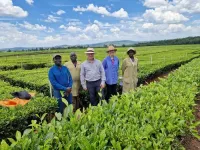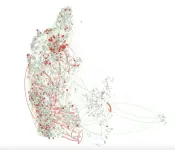(Press-News.org) Over 5,000 genetic variants that enable certain cancers to thrive have been identified by scientists, along with a potential therapeutic target to treat or even prevent these cancers from developing.
Researchers from the Wellcome Sanger Institute, and their collaborators at The Institute of Cancer Research, London and the University of Cambridge assessed the health impact of all possible genetic changes in the ‘tumour protection’ gene, BAP1. They found around a fifth of these possible changes were pathogenic, significantly increasing the risk of developing cancers of the eye, lung lining, brain, skin, and kidney.
The findings, published today (5 July) in Nature Genetics, are freely available so that they can be immediately used by doctors to help diagnose patients and choose the most effective therapies for them1. Importantly, as all possible variants were assessed, the findings benefit individuals from diverse ethnic backgrounds, who have historically been underrepresented in genetics research.
The team also uncovered a link between certain disruptive BAP1 variants and higher levels of IGF-1, a hormone and growth factor. This discovery opens the door to developing new drugs that could inhibit these harmful effects, potentially slowing down or preventing the progression of certain cancers.
The BAP1 protein acts as a powerful tumour suppressor in the body, protecting against cancers of the eye, lung lining, brain, skin, and kidney. Inherited variants that disrupt the protein can increase a person's lifetime risk of developing these cancers by up to 50 per cent2, typically occurring around middle age.
Detecting these variants early through genetic screening can guide preventative measures, greatly enhance treatment effectiveness and improve quality of life for individuals affected. However, until now, there has been limited understanding of which specific genetic changes in BAP1 to look out for, especially for rare variants that cause it to malfunction and fuel cancer growth.
Researchers from the Sanger Institute, and their collaborators at The Institute of Cancer Research and the University of Cambridge tested all 18,108 possible DNA changes in the BAP1 gene by artificially altering the genetic code of human cells grown in a dish, in a process known as ‘saturation genome editing’. They identified that 5,665 of these changes were harmful and disrupted the protein’s protective effects3. Analysis of UK Biobank data confirmed that individuals carrying these harmful BAP1 variants are over ten per cent more likely to be diagnosed with cancer than the general population.
The team also discovered that people with harmful BAP1 variants have elevated levels of IGF-1 in their blood, a hormone linked to both cancer growth and brain development. Even individuals without cancer showed these elevated levels, suggesting that IGF-1 could be a target for new treatments to slow down or prevent certain cancers. Further analysis revealed harmful BAP1 variants and higher IGF-1 levels were linked to worse outcomes in uveal melanoma patients, highlighting the potential for IGF-1 inhibitors in cancer therapy.
Notably, the technique profiles all possible BAP1 variants from diverse populations, not only those prevalent in European clinical records, helping to address the underrepresentation of non-European populations in genetic studies.
Dr Andrew Waters, first author of the study at the Wellcome Sanger Institute, said: “Previous approaches for studying how variants effect function in genes have been on a very small scale, or exclude important contexts that may contribute to how they behave. Our approach provides a true picture of gene behaviour, enabling larger and more complex studies of genetic variation4. This opens up new possibilities for understanding how these changes drive disease.”
Professor Clare Turnbull, clinical lead of the study, Professor of Translational Cancer Genetics at The Institute of Cancer Research, London, and Consultant in Clinical Cancer Genetics at The Royal Marsden NHS Foundation, said: “This research could mean more accurate interpretation of genetic tests, earlier diagnoses and improved outcomes for patients and their families.”
Dr David Adams, senior author of the study at the Wellcome Sanger Institute, said: “We want to ensure that life-saving genetic insights are accessible and relevant to all people, regardless of their ancestry. Our aim is to apply this technique to a wider range of genes, potentially covering the entire human genome in the next decade with the Atlas of Variant Effects.”
ENDS
Contact details:
Jelena Pupavac
Press Office
Wellcome Sanger Institute
Cambridge, CB10 1SA
Email: press.office@sanger.ac.uk
Notes to Editors:
Mesotheliomas with BAP1 variants have been found to respond well to specific drugs, so identifying these harmful variants helps doctors choose the most effective therapies. This personalised approach enhances treatment precision, potentially improving outcomes for patients with this type of cancer.
Variants in the BAP1 gene have been linked to uveal melanoma - eye cancer, mesothelioma - cancer of the lining of the lungs and abdomen, cutaneous melanoma - skin melanoma, brain cancer – meningioma, and renal cell carcinoma - kidney cancer. These tend to occur around middle age. While there are no definitive preventive measures, minimising exposure to known carcinogenic risk factors like asbestos, UV radiation, and adopting cancer screening is recommended for individuals with pathogenic BAP1 variants to aid early detection and treatment of BAP1-associated cancers.
For more information, access: https://www.eviq.org.au/cancer-genetics/consumer-information/3965-facts-for-people-and-families-with-bap1-tumou#more-information-and-support
Variants in the BAP1 gene have also recently been linked to very rare developmental disorders such as Küry-Isidor syndrome. For more information, access: https://www.sciencedirect.com/science/article/pii/S0002929721004663?via%3Dihub
A further 531 DNA changes in the BAP1 gene changed the function but were not harmful.
The team achieved a significant increase in gene editing efficiency, from less than five per cent to 60 per cent, by refining their techniques. They integrated the Cas9 protein into cell lines, improving both the accuracy and scalability of their experiments. This advancement allows for larger-scale studies and more complex analyses of genetic variations.
These data can be accessed here: https://github.com/team113sanger/Waters_BAP1_SGE
END
Thousands of high-risk cancer gene variants identified
Researchers have mapped the exact variants in a gene that dramatically increase a person’s risk of developing several types of cancer. This could lead to improved early detection and targeted treatment across diverse populations.
2024-07-05
ELSE PRESS RELEASES FROM THIS DATE:
Texas Tech professor receives DOE grant to advance clean energy
2024-07-05
Texas Tech University’s Qingwang Yuan, an assistant professor in the Bob L. Herd Department of Petroleum Engineering, has received a grant from the U.S. Department of Energy’s (DOE) Office of Fossil Energy and Carbon Management (FECM).
Yuan and Texas Tech will take the lead on a project titled, “Incubating Next Generation Clean Energy Scientists and Engineers Through Minority-Scholar Exchange and In-Situ Hydrogen Production Research.”
The research will be funded as part of an investment of more than $17 million from the DOE into 19 early-stage ...
Researchers find biological clues to mental health impacts of prenatal cannabis exposure
2024-07-05
By Leah Shaffer
Scientists are trying to understand how cannabis may affect long term neurodevelopment when people were exposed to it in the womb. Previous work by WashU researchers Sarah Paul and David Baranger in the Behavioral Research and Imaging Neurogenetics (BRAIN) lab led by Ryan Bogdan found associations between prenatal cannabis exposure and potential mental health conditions in childhood and adolescence, but potential biological mechanisms that could possibly explain this association were unclear.
In research published in ...
Self-driving technology: improving safety through sound
2024-07-05
Calyo, Benedex Robotics and Cranfield University have joined forces to improve safety in self-driving vehicles.
The new partnership, part of the DRIVEN BY SOUND project led by Calyo, will develop a functional safety sensing platform based on 3D ultrasound, capable of operating effectively in even the most challenging environmental conditions.
The new technology allows autonomous vehicles to detect their surroundings in 3D in real time. It complements existing sensing and safety detection systems, providing an additional layer of ...
Cranfield and LIPTON Teas and Infusions begin advanced climate change mitigation and resilience field trials
2024-07-05
The project, supported by the Biotechnology and Biological Sciences Research Council (BBSRC) and UK Tea & Infusions Association (UKTIA), aims to improve tea production standards and create data and resources that can benefit the whole industry. The project is co-led and managed by Dr Helen Saini, Head of R&D Sustainable Agriculture at LIPTON Teas and Infusions, and Andrew Thompson, Professor of Molecular Plant Science and Head of Soil, Agrifood and Biosciences at Cranfield University.
Tea has the second lowest carbon footprint after tap water but about a quarter of its total greenhouse gas emissions are attributed to fertiliser use. In addition, climate change ...
Engage in strategic discussions at Targeting EVs 2024: Program released with stimulating questions
2024-07-05
Malta, July 5, 2024 - The program for the highly anticipated world conference on Targeting Extracellular Vesicles (EVs) has been released. The event, organized by the World Mitochondria Society and the International Society of Microbiota, is scheduled to take place on October 17-18, 2024, at the Corinthia Palace in Malta.
Exploring Strategic Questions at Targeting EVs 2024
The Targeting EVs 2024 conference promises to explore the multifaceted roles of EVs, with a special focus on their interactions with mitochondria and microbiota.
The scientific ...
Smoking a key lifestyle factor linked to cognitive decline among older adults
2024-07-05
Smoking may be among the most important lifestyle factors affecting how quickly our cognitive skills decline as we age, suggests a new study led by UCL researchers.
The study, published in Nature Communications, analysed data from 32,000 adults aged 50 or over from 14 European countries who responded to surveys over 10 years.
The researchers investigated how rates of cognitive decline might differ among cognitively-healthy older adults with different combinations of health-related behaviours, including smoking, ...
Current strategies ineffective in controlling Salmonella Dublin in Danish cattle
2024-07-05
Limited impact of current movement restrictions highlights need for enhanced strategies, says study.
In a recent study published in the Journal of Dairy Science, researchers from the Complexity Science Hub (CSH), the University of Copenhagen, and SEGES have shown that despite stringent movement restrictions among Danish cattle farms Salmonella Dublin continues to propagate, indicating that current strategies are insufficient to curb the spread of the disease.
"We analyzed 11 years of data, including detailed information about ...
Military service's hidden health toll: servicewomen and their families endure increased chronic pain
2024-07-05
A new study led by investigators from Brigham and Women’s Hospital reveals that military women and female family members face significantly higher risks of chronic pain
Active-duty servicewomen who served during periods of heightened combat deployments (2006-2013) face a significantly heightened risk of chronic pain compared to those serving at other times, according to a new study from researchers at Brigham and Women’s Hospital, a founding member of the Mass General Brigham healthcare system. The study also found that female dependents of military personnel serving ...
Glucagon-like peptide 1 receptor agonists and 13 obesity-associated cancers in patients with type 2 diabetes
2024-07-05
About The Study: Glucagon-like peptide receptor agonists (GLP-1RAs) were associated with lower risks of specific types of obesity-associated cancers compared with insulins or metformin in patients with type 2 diabetes in this study. These findings provide preliminary evidence of the potential benefit of GLP-1RAs for cancer prevention in high-risk populations and support further preclinical and clinical studies for the prevention of certain obesity-associated cancers.
Corresponding Authors: To contact the corresponding authors, email Nathan A. Berger, M.D. (nab@case.edu) and Rong Xu, Ph.D. (rxx@case.edu).
To access the embargoed ...
Medicare eligibility and changes in coverage, access to care, and health by sexual orientation and gender identity
2024-07-05
About The Study: The findings of this cross-sectional study indicate that Medicare eligibility was not associated with consistently greater improvements in health insurance coverage and access to care among LGBTQI+ individuals compared with heterosexual and/or cisgender individuals. However, among sexual minority individuals, Medicare may be associated with closing gaps in self-reported health status, and among states with the highest disparities, it may improve health insurance coverage, access to care, and self-reported health status.
Corresponding Author: To contact ...
LAST 30 PRESS RELEASES:
Weight-loss wonder pills prompt scrutiny of key ingredient
Nonprofit leader Diane Dodge to receive 2026 Penn Nursing Renfield Foundation Award for Global Women’s Health
Maternal smoking during pregnancy may be linked to higher blood pressure in children, NIH study finds
New Lund model aims to shorten the path to life-saving cell and gene therapies
Researchers create ultra-stretchable, liquid-repellent materials via laser ablation
Combining AI with OCT shows potential for detecting lipid-rich plaques in coronary arteries
SeaCast revolutionizes Mediterranean Sea forecasting with AI-powered speed and accuracy
JMIR Publications’ JMIR Bioinformatics and Biotechnology invites submissions on Bridging Data, AI, and Innovation to Transform Health
Honey bees navigate more precisely than previously thought
Air pollution may directly contribute to Alzheimer’s disease
Study finds early imaging after pediatric UTIs may do more harm than good
UC San Diego Health joins national research for maternal-fetal care
New biomarker predicts chemotherapy response in triple-negative breast cancer
Treatment algorithms featured in Brain Trauma Foundation’s update of guidelines for care of patients with penetrating traumatic brain injury
Over 40% of musicians experience tinnitus; hearing loss and hyperacusis also significantly elevated
Artificial intelligence predicts colorectal cancer risk in ulcerative colitis patients
Mayo Clinic installs first magnetic nanoparticle hyperthermia system for cancer research in the US
Calibr-Skaggs and Kainomyx launch collaboration to pioneer novel malaria treatments
JAX-NYSCF Collaborative and GSK announce collaboration to advance translational models for neurodegenerative disease research
Classifying pediatric brain tumors by liquid biopsy using artificial intelligence
Insilico Medicine initiates AI driven collaboration with leading global cancer center to identify novel targets for gastroesophageal cancers
Immunotherapy plus chemotherapy before surgery shows promise for pancreatic cancer
A “smart fluid” you can reconfigure with temperature
New research suggests myopia is driven by how we use our eyes indoors
Scientists develop first-of-its-kind antibody to block Epstein Barr virus
With the right prompts, AI chatbots analyze big data accurately
Leisure-time physical activity and cancer mortality among cancer survivors
Chronic kidney disease severity and risk of cognitive impairment
Research highlights from the first Multidisciplinary Radiopharmaceutical Therapy Symposium
New guidelines from NCCN detail fundamental differences in cancer in children compared to adults
[Press-News.org] Thousands of high-risk cancer gene variants identifiedResearchers have mapped the exact variants in a gene that dramatically increase a person’s risk of developing several types of cancer. This could lead to improved early detection and targeted treatment across diverse populations.



